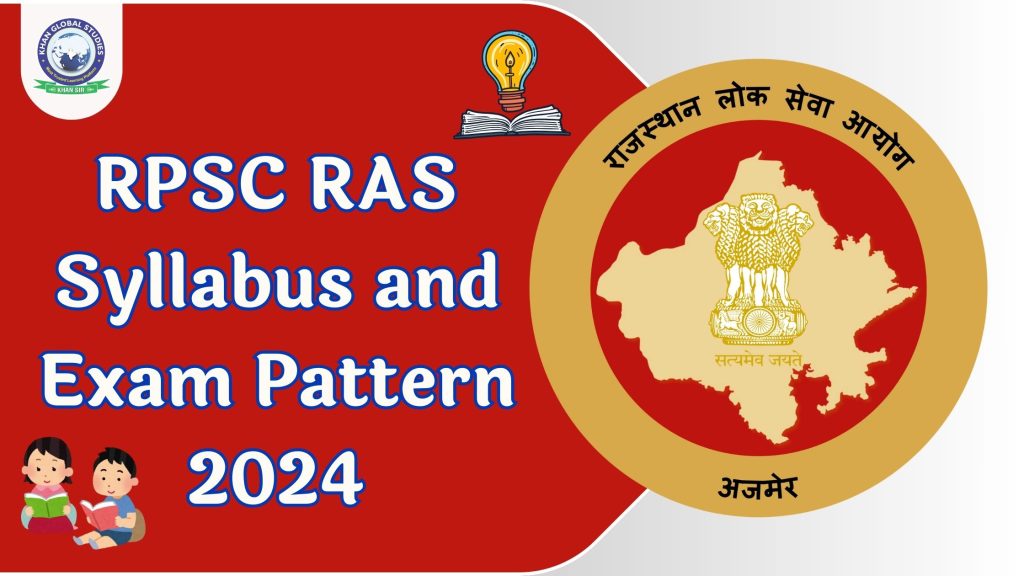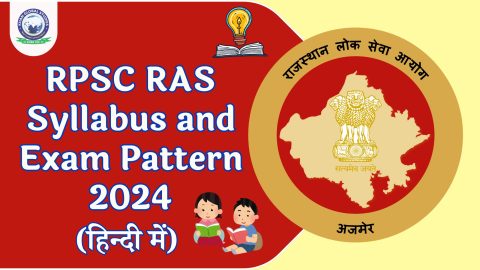Rajasthan Public Service Commission (RPSC) has unveiled the RAS 2025 syllabus for candidates preparing for the prestigious Rajasthan Administrative Services. Candidates can now start their strategic preparation using this detailed syllabus as well as the respective exam pattern.
In this article, you will get a detailed description of the prelims and mains syllabus and exam structure for RPSC RAS 2025.
RPSC RAS Syllabus and Exam Pattern 2025 Overview
| Conducting Body | Rajasthan Public Service Commission (RPSC) |
| Exam Name | RPSC RAS Exam 2025 |
| Post Name | Rajasthan Administrative Service (RAS) |
| Selection Process | Prelims, Mains and Interview |
| Job Location | Rajasthan |
| Official Website | https://rpsc.rajasthan.gov.in/ |
RPSC RAS Syllabus 2025
We have outlined the subject-specific RPSC RAS syllabus 2025 in this article, which is combined with the exam pattern for a holistic understanding. The RPSC RAS 2025 assessment takes place in two stages: prelims and mains. Here, candidates can explore the comprehensive syllabus for each stage.
By availing of the RPSC RAS syllabus 2025, candidates can create a customized study plan. It is necessary to qualify for both the prelims and main stages to secure a place in the RPSC RAS 2025 roster. Enthusiastic candidates are encouraged to review the syllabus and begin their preparation.
RPSC RAS Prelims Syllabus 2025
The prelims phase of RPSC RAS 2025 covers a wide variety of topics, from history and culture to geography, economics, and general knowledge. Below, you will find a topic-wise description of the prelims syllabus.
History, Art, Culture, Literature, Tradition, and Heritage of Rajasthan
- Rajasthani Culture, Traditions, and Heritage.
- Historical Events in the Historical Timeline of Rajasthan.
- Movements for Independence, Political Awakening, and Integration.
- Local Dialects, Fairs, Festivals, Folk Music, and Dances.
- Architectural Wonders – Forts, Monuments, Arts, Paintings, and Crafts.
- Major Works in Rajasthani Literature.
- Religious Movements, Major Saints, and Folk Devtas of Rajasthan.
- Important Tourist Attractions and Notable Personalities.
Geography of India
- Indian Geographical Features.
- Agriculture and Agro-Based Enterprises.
- Main Mineral Resources – Iron, Manganese, Coal, Oil, Atomic Minerals.
- Major Industrial Centers and Development.
- Natural Resources and Environmental Concerns.
- India’s transportation network and major corridors.
- Geography of Rajasthan
- Physical features and geographical divisions.
- Climate, natural vegetation and wildlife.
- Major irrigation initiatives and mineral resources.
- Major industries and industrial potential.
- World Geography focuses on:
- Major physical features.
- Ecology and environmental issues.
- Biodiversity and wildlife conservation.
- International waterways and industrial regions.
Indian History
- Ancient and medieval India: major events, art, architecture, culture and literature.
- Important dynasties, their rule and socio-economic conditions.
- Important movements in history.
- The journey of modern India from the 18th century to the present, including important events, personalities and issues.
- Indian freedom struggle and its important contributors from various fields.
- Social and religious reform movements of the 19th and 20th centuries.
- Consolidation and national reorganization after independence.
Indian Constitution, Governance and Political Systems
- An overview of India’s political framework and governance models.
- Indian democracy, state reorganization, coalition politics and national integration.
- Structure and functions of major institutions like the President, Parliament, Supreme Court and others.
- Panchayati Raj System and Local Self-Government.
Indian Economy and Key Aspects
- Basic concepts in economics.
- Knowledge of banking, budgeting, public finance, national income and more.
- Fiscal and monetary policies, stock market and subsidies.
- Current economic challenges and government initiatives.
- Five-year plans: objectives, strategies and achievements.
- Major sectors of the economy: agriculture, industry and services.
Economy of Rajasthan
- A comprehensive view of the economy of Rajasthan.
- Agriculture, industry and services sectors: growth trends and challenges.
- Major development projects and infrastructure.
- Government welfare programmes for marginalised groups, women and others.
Science and Technology
- Basics of everyday science, space and defence technology and biotechnology.
- Impact on human health, nutrition and environment.
- Emerging areas like nanotechnology and genetic engineering.
- Reasoning and mental ability
- Logical and analytical reasoning.
- Problem-solving using numerical and statistical methods.
Political and Administrative System of Rajasthan
- Governor
- Chief Minister
- State Assembly
- High Court
- Rajasthan Public Service Commission
- District Administration
- State Human Rights Commission
- Lokayukta
- State Election Commission
- State Information Commission
- Public Policy, Legal Rights, and Citizen Charter
Logical Reasoning (Deductive, Inductive, Abductive)
- Analytical Reasoning
- Mental Ability: Number series, Letter series, Odd man out, Coding-Decoding, Problems relating to Relations, Shapes, and their sub-sections
- Basic Numeracy: Elementary knowledge of Mathematical and Statistical Analysis
- Number System
- Order of Magnitude
- Ratio, and Proportion
- Percentage
- Simple and Compound Interest
- Data Analysis (Tables, Bar diagram, Line graph, Pie-chart)
Current Affairs
- Major events in Rajasthan, India and the world.
- Important personalities and places in the news.
- Sports and related activities.
RPSC RAS Preliminary Exam Pattern 2025
The preliminary exam, which is qualifying in nature, consists of multiple-choice questions for 200 marks. Performance in this stage does not contribute to the final merit list, but successful candidates proceed to the main exam.
| Subject | No. of Questions | Maximum Marks | Time Duration |
| General Knowledge | 150 | 200 | 3 Hours |
RPSC RAS Mains Syllabus 2025
The main exam consists of four papers, covering a range of topics. The detailed description is given below:
Paper I: General Knowledge
History
History, Art, Culture, Literature, Tradition, and Heritage of Rajasthan
- Major landmarks in the History of Rajasthan from Prehistoric times to the close of the 18th Century, Important dynasties, their administrative and revenue system
- Salient events of the 19th & 20th centuries: Peasant & Tribal Movements. Political Awakening, Freedom Movement, and Integration
- Heritage of Rajasthan: Performing & fine Art, Handicraft and Architecture; Fairs, Festivals, Folk Music and Folk Dance
- Important works of Rajasthani Literature and Dialects of Rajasthan
- Saints, Lok Devtas, and eminent personalities of Rajasthan
Indian History & Culture of Indian Heritage
- Fine Art, Performing Art, Architecture & Literature from Indus Civilization to British Era
- Religious Movements and religious philosophy in Ancient and Medieval India
- History of Modern India from the beginning of the 19th Century to 1965 AD: Significant events, personalities, and issues
- Indian National Movement- Its various stages & streams, important contributors, and contributions from different parts of the country
- Socio-religious Reform Movements in the 19th and 20th Century
- Post Independence consolidation and reorganization – Accession of princely states & Linguistic reorganization of the states
History of the Modern World (up to 1950 AD)
- Renaissance and Reformation
- Enlightenment and Industrial Revolution
- Imperialism and Colonialism in Asia and Africa
- Impact of World Wars
Economics
Indian Economy
- Major Sectors of Economy: Agriculture, Industry & Service- Current Status, Issues, and Initiatives
- Banking: Concept of Money Supply & High Powered Money. Role and Functions of Central Bank & Commercial Banks, issues of NPA, Financial
- Inclusion. Monetary Policy- Concept, objectives & Instruments
- Public Finance: Tax reforms in India- Direct & Indirect, subsidies- Cash Transfer and other related issues. Recent Fiscal Policy of India
- Recent Trends in Indian Economy: Role of Foreign Capital, MNCs, PDS, FDI, Exim Policy, 12th Finance Commission, Poverty Alleviation Schemes
World Economy Global Economic issues and trends
- Role of World Bank, IMF & WTO
- Concept of Developing, Emerging, and Developed Countries
- India in Global Scenario
Economy of Rajasthan
- Agriculture, Horticulture, Forestry, Dairy, and Animal husbandry with special reference to Rajasthan
- Industrial Sector- Growth and recent trends. Growth, Development & Planning with special reference to Rajasthan
- Recent developments and issues in the service sector of Rajasthan
- Major Development Projects of Rajasthan- their objectives and impact
- Public-Private Partnership Model for Economic Transformation in Rajasthan
- Demographic Scenario of the State and its Impact on the Rajasthan Economy
Sociology, Management, Accounting and Auditing
- Key sociological concepts such as caste, class, and secularism.
- Management techniques, financial statement analysis, and social responsibility.
- Basic principles of auditing and budgetary control mechanisms.
Paper II: Logical Reasoning, Mental Ability, and Basic Numeracy
- Logical Reasoning (Deductive, Inductive, Abductive): Statement and Assumptions, Statement and Argument, Statements and Conclusion, Courses of Action
- Analytical Reasoning
- Mental Ability: Number series, Letter series, Odd man out, Coding-Decoding, Problems relating to Relations, Shapes, and their sub-sections
- Basic Numeracy: Elementary knowledge of Mathematical and Statistical Analysis
- Number System, Order of Magnitude, Ratio, Proportion, Percentage, Simple and Compound Interest, Data Analysis (Tables, Bar diagram, Line graph, Pie-chart)
General Science & Technology Syllabus
- Motion, laws of motion, work energy and power, rotational motion, simple harmonic motion, gravitation, waves
- Properties of matter, electrostatics, current electricity, moving charge and magnetism
- Ray optics, Nuclear physics, semiconductor devices
- Electromagnetic waves, communication systems, basics of computers, use of information technology in administration, e-governance and e-commerce, contributions of Indian scientists in the development of science
- States of matter, Atomic structure, chemical bonding and molecular structure, equilibriums
- Thermodynamics, kinetic theory of gases, solid state, solutions, electrochemistry, Chemical kinetics
Characteristic features of life
- Nutrition in organisms
- Principal of inheritance and variation
- Human health and diseases
- Biotechnology and its applications
- Biodiversity and Conservation
- Ecosystems Agriculture, Horticulture, Forestry, Dairy and Animal Husbandry with special reference to Rajasthan
Earth Science Syllabus
- Ethics and Human Values: Lesson from the lives and teachings of great leaders, reformers, and administrators
- Role of family, society, and educational institutions in inculcating values
- Ethical concept and Rin, the concept of Duties, the concept of Good and Virtues
- Ethics in private and public relationships- Behaviour, Moral and Political attitudes of administrators – Philosophical basis of Integrity
- Ethics of Bhagavad Geeta and its Role in Administration
- Gandhian Ethics
- Contribution of Moral Thinkers and Philosophers from India & World
- Psycho-Stress Management
- Case Studies
- Emotional Intelligence – Concepts and their Utilities
Paper III: General Knowledge and General Studies
Indian Political System, World Politics and Current Affairs
- Indian Constitution
- Ideological Contents: Institutional Framework- I, Institutional Framework- II, Institutional Framework- III
- Political Dynamics
- State Politics of Rajasthan
- Emerging World Order in the post-Cold War era, USA’s hegemony and its resistance, UN and Regional Organizations, International Terrorism, and Environmental issues
- Foreign Policy of India
- Geo-political and Strategic development in South Asia, South East Asia, and West Asia and their impact on India
- Current Affairs
Administrative Ethics, Behaviour, and Law Syllabus
- Administrative Ethics
- Dimensions of Ethics
- Administrative Ethics
- Ethics in Private and Public Relationships
- Behaviour
- Intelligence
- Personality
- Learning and Motivation
- Meeting Life Changes: Stress
- Law
- Concepts of Law
- Contemporary Legal Issues
- Important Land Laws in Rajasthan
- Crimes against Women and Children
Paper IV: General Hindi and General English
- Grammar and Usage
- Sentence Correction: 10 sentences with errors related to:
- Articles and Determiners
- Prepositions
- Tenses and Sequence of Tenses
- Modals
- Active and Passive Voice
- Direct and Indirect Speech
- Vocabulary
- Synonyms and Antonyms
- Phrasal Verbs and Idioms
- One-Word Substitutes
- Commonly Confused or Misused Words
- Comprehension, Translation, and Precis Writing
- Unseen Passage: A passage of about 250 words followed by 5 questions.
- Question 5 will focus on vocabulary.
- Translation: Translate five sentences from Hindi to English.
- Precis Writing: Summarize a short passage of 150-200 words.
- Composition and Letter Writing
- Write one paragraph (about 200 words) from a choice of three topics.
- Elaborate on one of the three given themes (about 150 words).
- Write a letter or report of about 150 words.
RPSC RAS Mains Exam Pattern 2025
The RPSC RAS Mains exam is carefully designed as a descriptive assessment, consisting of four compulsory papers. Candidates who qualify for the preliminary exam will be provided with an admit card to appear for the main stage of the recruitment process.
- Exam Type: Descriptive Format
- Number of Papers: Four Compulsory Papers
- Qualification Level: Graduate Degree
- Question Distribution:
- Short Answer Questions: 2
- Medium Answer Questions: 5
- Long Answer Questions: 10
| Paper | Subject | Maximum Marks | Time Duration |
| Paper 1 | General Studies I | 200 | 3 Hours |
| Paper 2 | General Studies II | 200 | 3 Hours |
| Paper 3 | General Studies III | 200 | 3 Hours |
| Paper 4 | General Hindi & General English | 200 | 3 Hours |
Each paper is designed to evaluate the candidate’s comprehensive understanding, analytical abilities, and proficiency in expressing responses with clarity and precision. The structure ensures a balanced assessment of both breadth and depth of knowledge across various subjects.
Conclusion
The journey to secure a post through the Rajasthan Public Service Commission requires a well-structured preparation strategy to earn it. The RPSC RAS Syllabus 2025, with defined exam patterns for both prelims and mains, serves as a baseline blueprint for candidates. By delving into the intricate details of each subject area and following a disciplined study regime, candidates can enhance their chances of excelling in this competitive exam.
The dual-stage assessment system tests not only the candidate’s factual knowledge but also their ability to apply concepts in real-world scenarios. Therefore, a holistic approach that includes both theoretical understanding and practical application is paramount. Aspiring candidates are encouraged to use the syllabus as a roadmap, regularly self-evaluate through mock tests, and seek guidance to navigate the complexities of the RPSC RAS 2025 exam.
With dedication, perseverance, and strategic preparation, cracking RPSC RAS 2025 is within reach. Start your preparation today, align your study plans with the given syllabus and exam pattern, and take confident steps towards a rewarding career in Rajasthan Administrative Services.



